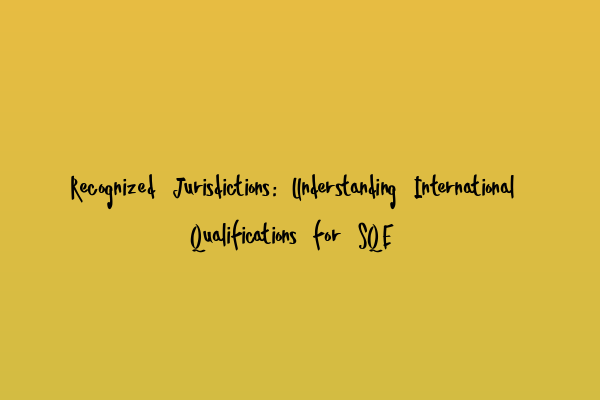Recognized Jurisdictions: Understanding International Qualifications for SQE
If you are an aspiring solicitor looking to practice law in England and Wales, understanding the requirements and qualifications necessary for the Solicitors Qualifying Examination (SQE) is crucial. In today’s globalized world, many individuals hold international qualifications, and it is essential to know how these qualifications align with the SQE standards.
The SQE, which is set to replace the existing QLTS (Qualified Lawyers Transfer Scheme), is a comprehensive examination designed to ensure that all solicitors, regardless of their educational background, meet the required standards to practice law. While the SQE is primarily focused on individuals who have completed their legal education in England and Wales, the system also recognizes certain international jurisdictions.
So, what does it mean for an international qualification to be recognized? Simply put, it means that individuals who hold these qualifications may be exempt from certain elements of the SQE, allowing them to fast-track their path to becoming a solicitor.
To provide more clarity, let’s explore two recognized jurisdictions and how their qualifications align with the SQE:
1. United States:
The United States is one of the recognized jurisdictions under the SQE framework. If you have completed your legal education in the US, you may be eligible for exemptions from certain SQE elements. It is important to understand that these exemptions are not automatic, and you will still need to meet specific criteria to be considered.
For example, if you have completed a Juris Doctor (JD) degree from an American Bar Association (ABA) approved law school, you may be eligible for exemptions from the SQE’s Legal Research and Writing (LRW) assessments. However, it is important to note that additional requirements, such as the completion of a qualifying work experience, may still be necessary to qualify as a solicitor.
2. Australia:
Australia is another recognized jurisdiction, and qualifications from Australian institutions are considered for exemptions under the SQE. If you have completed a Bachelor of Laws (LLB) or Juris Doctor (JD) degree from an approved Australian university, you may be eligible for certain exemptions.
Similarly to the United States, exemptions in Australia are not automatic, and additional criteria need to be met. For example, candidates with an LLB or JD from a recognized Australian institution may be exempt from the SQE’s Foundations of Legal Knowledge (FLK) assessments. However, a qualifying work experience would still be required.
It is important to note that while these recognized jurisdictions offer exemptions, they do not provide a direct route to qualification as a solicitor. Candidates will still need to fulfill additional requirements, including the completion of the SQE examinations and a qualifying work experience.
Whether you hold an international qualification or not, it is crucial to ensure that you thoroughly understand the SQE requirements and the specific exemptions available to you. The Solicitors Regulation Authority (SRA) provides detailed information regarding the qualifications and jurisdictions considered for exemptions. It is advisable to consult with legal professionals and relevant authorities to determine your eligibility and create a strategic plan to meet the necessary criteria.
In conclusion, for individuals holding international qualifications, understanding the recognition provided by the SQE is essential. Recognized jurisdictions, such as the United States and Australia, offer certain exemptions from specific elements of the SQE. However, it is crucial to remember that meeting additional criteria, including the completion of the SQE exams and qualifying work experience, remains a requirement. By understanding these nuances and seeking guidance and support, you can navigate the SQE process effectively and enhance your chances of becoming a qualified solicitor in England and Wales.
For more information on recognized jurisdictions, exemptions, and the SQE, please refer to the Solicitors Regulation Authority (SRA) website.

Leave a Reply